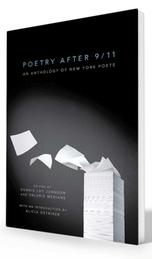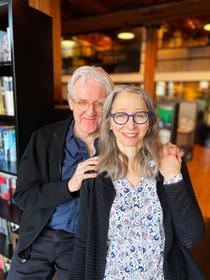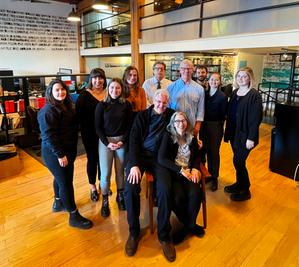 Long ago--let's call it the turn of the century--I was a devoted reader of Dennis Johnson's blog MobyLives, which looked at the book trade through an alternative, sharp, perceptive lens. He opened up a conversation that was necessary and, quite often, he was just so damned funny. MobyLives also had a motto: "That Whale Is Out There, Man!"
Long ago--let's call it the turn of the century--I was a devoted reader of Dennis Johnson's blog MobyLives, which looked at the book trade through an alternative, sharp, perceptive lens. He opened up a conversation that was necessary and, quite often, he was just so damned funny. MobyLives also had a motto: "That Whale Is Out There, Man!"
In 2002, Melville House Publishing, co-founded by Johnson and his wife, Valerie Merians, launched with Poetry After 9/11, parts of which had appeared on the blog and generated national attention. As other titles followed, Johnson and Merians began calling on indie bookstores to introduce themselves and their evolving list. That's how I first met them, briefly, at the Northshire Bookstore, Manchester, Vt., where I was a bookseller.

|
|
| Dennis Johnson & Valerie Merians | |
MobyLives Radio ("Tired of blogs? Me too. MobyLives Radio is next ") hit the virtual airwaves in the fall of 2005, and Johnson even interviewed me while I was working the frenzied sales floor on Black Friday. Eventually I visited both the original MobyLives/Melville House Intergalactic World Headquarters in Hoboken, N.J.; and later their cool office/bookstore space in Brooklyn's DUMBO neighborhood. And I read the books.
Over the years, Johnson and I have engaged in a long-running--if never frequent enough--conversation about the book business and indie booksellers/publishers, which makes this month's celebration of Melville House's 20th anniversary feel just a little personal for me.
In a recent interview, he spoke about the publisher's deep-rooted connection to indie booksellers. "One of our most vivid memories, from the days when we would go into bookstores to see if they were carrying our books, was when we walked into the Posman's that used to be in Grand Central Terminal," he recalled. "There, by the cash wrap, was a tall stack of our just-published second book, A Reader's Manifesto. Maybe 20 copies. We were floored and immediately asked to speak to the manager (we didn't know to ask for the buyer yet). We asked him if he usually put books of literary criticism there. He said no, that was usually where he stacked whatever book was reviewed in the New York Times that day. Commuters read the paper on the train to work and books well reviewed fly off that spot, he explained. But two things had happened, he explained: one, a bad review; and, two, he liked little presses and thought our book was great for his particular clientele. We later learned the friendly guy we'd spoken to was Robert Fader, one of the owners of Posman's."

|
|
| Melville House staff | |
Citing the rise of Amazon as one of the most unexpected and damaging changes in the book industry this century, Johnson added: "The most welcome development is the way indie booksellers took on the challenge of the pandemic, and, seemingly overnight, developed a skill most of them hadn't had before, which is how to sell books online. The way they did that, and simultaneously developed other new ways to serve their clientele, such as delivery and curbside pick-up, is going to have a wonderful, long-term impact on the survival of indie bookselling and the war against Amazon. It's been great for all of us, business-wise, and damned inspiring."
Predictions about the future of the book business often seem to have more in common with astrology than analysis, but Johnson shared his thoughts regarding the challenges Melville House must prepare for over the next five to 10 years.
"Well, all the big-house mergers are deeply concerning. Even though the big five only represent about 50% of annual book sales, they control pretty much 100% of the marketplace," he observed. "Given that 50-50 split of sales between the big players and everyone else, one would think retailers would be just as supportive of small presses, university presses, and non-profits as they are the big houses, but that's just not the case--with the notable exception of most indie booksellers.
 "Our hope is that a larger swath of retailers will emulate those indie booksellers. When you walk into City Lights [San Francisco, Calif.] or Solid State Books [Washington, D.C.] or DIESEL, A Bookstore [Brentwood & Del Mar, Calif.], for example, you're just as likely to see a book from Akashic or Graywolf or Milkweed on display as you are a Knopf or FSG title. Given the way discovery works in a brick-and-mortar setting--whereby people are inspired to buy things in addition to what they came in for--that's smart bookselling."
"Our hope is that a larger swath of retailers will emulate those indie booksellers. When you walk into City Lights [San Francisco, Calif.] or Solid State Books [Washington, D.C.] or DIESEL, A Bookstore [Brentwood & Del Mar, Calif.], for example, you're just as likely to see a book from Akashic or Graywolf or Milkweed on display as you are a Knopf or FSG title. Given the way discovery works in a brick-and-mortar setting--whereby people are inspired to buy things in addition to what they came in for--that's smart bookselling."
One of the first posts I ever wrote for Fresh Eyes: A Bookseller's Journal, my own early 21st-century blog, was headlined "News Flash: Publishers Hate Rejection, Too." Near the end, I noted: "When I love a book, I'll make it fly for them. Sometimes they strike gold first time into the mine. A while back, Valerie Merians of Melville House sent me a hardcover copy of Rob Laughner's novel Our Nun, which has just come out in paperback. I'll write in more detail about this very funny book a bit later, but I'm already working hard to find it an audience. Will Melville House send me another book? I don't know."
As it turned out, they did and I'm still a fan, highlighting most recently Rónán Hession's beautiful novel Leonard and Hungry Paul and the role bookseller Martin Sorensen of Green Apple Books, San Francisco, Calif., played in bringing Robert J. Lloyd's excellent debut novel, The Bloodless Boy, to Melville House's attention.
In 2008, Johnson told me that "nobody, and I mean nobody, has a stronger sense of common mission with indie booksellers than indie publishers, especially us. We share each other's pain, and joy for that matter; we see it as part of the same thing. Melville House is more about celebrating that very concept than anything else.... The motto will never change." That whale is still out there, man!

